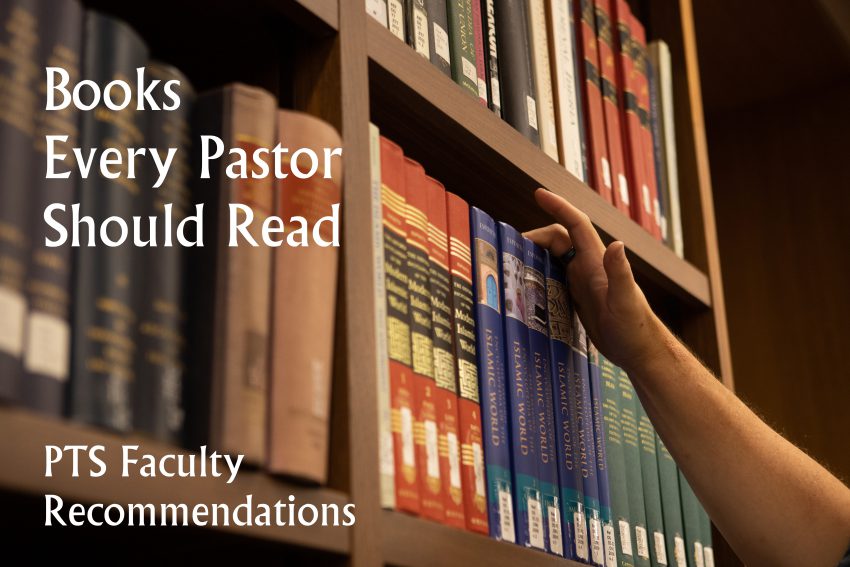“What are some books that every pastor should read?”
PTS faculty were asked this question in spring 2023, resulting in a very long list of recommendations. Rather than list specific titles, Directors’ Bicentennial Professor of Theology the Rev. Dr. Edwin Chr. van Driel suggests nine categories of books for pastors to consider. He says:
“’Every pastor’ is quite a wide category. It is hard to think in such universal terms for something that is so context-dependent as ministry. For that reason, I’m going to cheat in two ways. One, I will read ‘every pastor’ as ‘every pastor that is educated at a seminary like ours and serving in a North American context.’ And two, I am going to recommend categories rather than single titles.”
With this in mind, Dr. van Driel recommends that every pastor read books about:
Pastoral Ministry
- Books that help you think about ministry as, first of all, Jesus’ job rather than yours. Fresh out of seminary you may read lots of books about “things they didn’t teach me in seminary”: how to catechize the youth, lead a church council meeting, do a funeral. After the first year or so you realize that doing all these things well does not prevent your church from getting into conflicts, failing to grow, or losing its traditional place in the culture. So you’ll start reading books on how to deal with that. A few years in, the burden of ecclesial survival rests on your shoulders. Then it is good to read some books to remind you that the church already has a Savior, and that your ministry is always embedded in what Jesus already is doing. Dig up some old books by former PTS professors Andrew Purves or Craig Barnes. Find contemporary voices that continue that tradition of reflection on the pastoral call. You’ll need it.
- A pastoral autobiography that reflects the context in which one serves. Do you serve a small country church? Read Richard Lischer’s Open Secrets. Do you serve in an urban environment? Read Heidi Neumark’s Breathing Space. Serving in the suburbs? Read Eugene Peterson’s The Pastor.
- An honest book about death. Read Nick Wolterstorff’s Lament for a Son, Richard Lischer’s Stations of the Heart, or Kate Bowler’s No Cure for Being Human.
Theology
- A one- or two-volume systematic theology in one’s own theological tradition. Hopefully in seminary you learned the grammar of Christian doctrine. Without being tribal about it, as a pastor you need to be fluent in the theological language your people have developed using that grammar. So if you are Methodist, study Geoffrey Wainwright’s Doxology. If you are Lutheran, read Braaten and Jenson’s Christian Dogmatics or the work of Ian McFarland. And so on. Your seminary theology professors will surely help you find books in other traditions.
- A biography of a great theologian. One of the enduring, and frankly, hurtful myths is that theology is an ivory tower exercise (hurtful to the church, that is). Read Eberhard Busch’s Karl Barth, Geoffrey Wainwright’s Lesslie Newbigin, Bruce Gordon’s Calvin, or Peter Brown’s Augustine of Hippo and see how great theology is embedded in the drama of life. Be careful: you may end up wanting to read these theologians’ writings as well.
- A theological text masquerading as a children’s book. Read The Runaway Bunny. Or The Pout-Pout Fish. Theological anthropology is everywhere.
Culture
- A big book that helps you reflect deeply on the nature of our culture. These are books that are hard to read in seminary; they demand a knowledge of cultural history that you are still acquiring as you take courses in church history, theology, etc. These books are demanding and need to be read slowly. But they help you take the long view as we negotiate cultural change and tension. Read a book like Charles Taylor’s The Secular Age, Louis Dupré’s The Enlightenment and the Intellectual Foundations of Modern Culture, or Willie Jennings’ The Christian Imagination.
- A sustained theological conversation located in a context that is really different (racially, economically, socially, politically) from yours. It’s commendable when pastors read widely. It’s also commendable when in our deeply polarized society pastors consciously try to read people who are located in very different contexts. But most books, articles, and blog posts are really part of a wider conversation. In order to truly cross boundaries, pick a conversation you’re interested in and commit to following it for the long term.
Biblical Studies
- A new academic Bible commentary every few years. The relentless rhythm of weekly preaching has the danger that pastors approach the Scriptures through the lens of Lectionary readings, preaching texts, and Feasting on the Word. It’s easy to lose sight of the fact that every Scripture text is part of a larger narrative that needs to be understood in its own context. Reading a new commentary from cover to cover once every few years will help you to keep honest about that.

